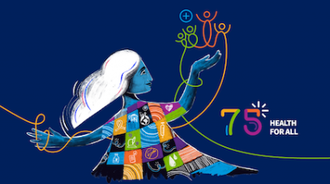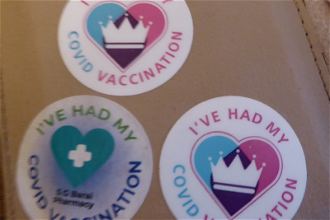Signs of life and hope on World Health Day

In 1948 the countries of the world came together and founded the World Health Organization (WHO) 'to promote health, keep the world safe and serve the vulnerable so that 'everyone, everywhere can attain the highest level of health and well-being.'
On 7th April 2023, 'World Health Day', the WHO will celebrate its 75th anniversary Their website says that WHO's 75th anniversary year 'is an opportunity to look back at public health successes that have improved quality of life during the last seven decades.'
When I thought of public health successes of the last 75 years, the Rotavirus vaccine immediately came to mind. Throughout much of human history, hundreds of thousands of children died every year from acute gastroenteritis, with symptoms such as severe diarrhoea and vomiting. Despite it being one of the leading causes of child illness and mortality, no one had any idea what was causing it.
Exactly 50 years ago, in 1973 a young Australian virologist named Ruth Bishop and her team in Melbourne first identified the cause. Using an electron microscope Ruth Bishop identified what is now known as rotavirus. Her work paved the way for the discovery of a live oral vaccine that significantly reduces the severity of the disease and now saves hundreds of thousands of young lives around the world every year. In 2006, the WHO approved for global use vaccines against rotavirus with remarkable success. In 2000, 528,000 children died of rotavirus. By 2016, that number fell to 128,500.
Dr George Armah, a medical researcher in Ghana, describes how pre-2012 in Ghana in the months of October to April, the paediatric emergency rooms were always filled with mothers desperately trying to find a space for their child sick with severe, life-threatening diarrhoea. In 2012 Ghana introduced the rotavirus vaccine for every child and consequently the burden of rotavirus has reduced significantly. Now those same wards are virtually empty except for a few malaria cases.
The WHO website suggests that the 75th anniversary is 'also an opportunity to motivate action to tackle the health challenges of today and tomorrow.' Pope Francis, in his 2023 World Day of Peace message, suggests that 3 years after the start of the Covid-19 pandemic is a time to be asking the same questions.
'Today we are being asked: What did we learn from the pandemic? What new paths should we follow to cast off the shackles of our old habits, to be better prepared, to dare new things? What signs of life and hope can we see, to help us move forward and try to make our world a better place?'
'……to live better lives after the Covid-19 emergency, we cannot ignore one fundamental fact, namely that the many moral, social, political and economic crises we are experiencing are all interconnected, and what we see as isolated problems are actually causes and effects of one another. Consequently, we are called to confront the challenges of our world in a spirit of responsibility and compassion. We must revisit the issue of ensuring public health for all.'
As the COVID-19 pandemic has shown, vaccines are among the most powerful tools we have to protect humanity from infectious diseases. The Coalition for Epidemic Preparedness Innovations (CEPI) is a global partnership to accelerate the development of vaccines against emerging infectious diseases and ensure everyone around the world has access to them (the chances of another pandemic have been estimated at between 47% and 57% in the next 25 years). In 2021, G7 and G20 governments committed to the '100 Days Mission', to ensure that diagnostics, treatments and vaccines could be deployed within the first 100 days of a pandemic threat being identified.
Last February, campaigners asked the UK Government to invest £300 million in CEPI over 5 years, but the UK only provided £160 million using the overseas development budget. Overall, CEPI is US $1.5 billion short of the $3.5 billion it needs to deliver the 100 Days Mission.
In May, the G7 Leaders' Summit will meet again in Japan. This will be a chance for G7 countries (the world's richest countries) to demonstrate that they are still committed to financing pandemic preparedness and response, as they said they were back in 2021 and recommit to the 100 Days Mission. It is to be hoped that the UK Government will support the 100 Days Mission at the Summit by increasing its investment in CEPI to £300 million.
Supporting future vaccine development is a flagship policy for the Government UK Prime Minister; Rishi Sunak has often spoken of his commitment to Research and Development (R&D). Wanting to ensure the UK is a hub for R&D, including disease threats, the Prime Minister is to be commended for creating the new Department for Science, Innovation and Technology, for clearly this new department has a role to play in increased funding to CEPI enabling it to deliver the 100 Days Mission.
In 1948, the WHO grew out of a realisation by the countries of the world that we must all work together if the health crises of the world are to be addressed. That realisation is no less pertinent today. Pope Francis would agree:
'This (Covid-19) experience has made us all the more aware of the need for everyone, including peoples and nations, to restore the word "together" to a central place. For it is together, in fraternity and solidarity, that we build peace, ensure justice and emerge from the greatest disasters
'Certainly, after directly experiencing the fragility of our own lives and the world around us, we can say that the greatest lesson we learned from Covid-19 was the realization that we all need one another. That our greatest and yet most fragile treasure is our shared humanity as brothers and sisters, children of God. And that none of us can be saved alone. Consequently, we urgently need to join together in seeking and promoting the universal values that can guide the growth of this human fraternity.' (Message for World Day of Peace 2023)
Please ask the Prime Minister Rishi Sunak to support the 100 Days Mission at the G7 Leaders' Summit and to encourage other G7 countries to support CEPI too.
For more information and to take action see:
https://results.eaction.org.uk/cepi-100-days-mission-2023
www.results.org.uk/sites/default/files/files/CEPI%20Action%20Material%20-%20April%202023.pdf


















